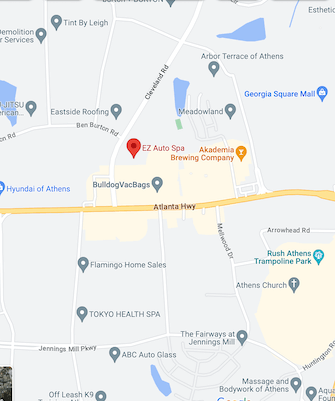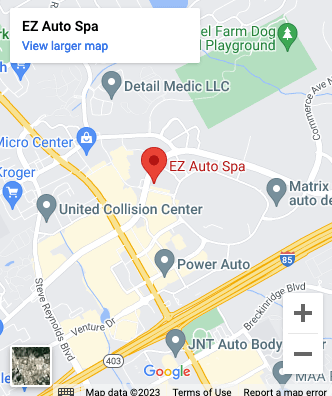Nissan Altima Dent Repair, Ceramic Coating & PPF
Your Nissan Altima deserves the best protection and care to maintain its sleek appearance and resale value. Whether you’re dealing with minor dents from parking lot mishaps or want to shield your vehicle’s paint from Georgia’s harsh UV rays and road debris, EZ Auto Spa has become the trusted choice for Altima owners throughout Georgia and beyond.
As specialists in paintless dent repair, ceramic coating, and paint protection film (PPF), we understand that your Altima represents both reliable transportation and a significant investment. Our three signature services work together to keep your sedan looking showroom-fresh while protecting against everyday wear and tear.
From removing unsightly dings without affecting your factory paint to applying advanced ceramic coatings that repel contaminants, we deliver professional-grade results with a luxury experience. Your Altima’s smooth lines and refined finish respond exceptionally well to our protection services, ensuring you’ll enjoy that new-car appearance for years to come.
Serving Atlanta + Athens
EZ Auto Spa has two locations conveniently located to serve the Metro Atlanta & Metro Athens area. We serve a wide geographic area and can work with your schedule to make your service happen.
Open Weekdays from
8:30-5:00
Call to ask any question
706-971-7867
What Is Paintless Dent Repair for Nissan Altima
Paintless dent repair (PDR) removes dents from your Nissan Altima’s body panels without damaging the original paint. This technique preserves your Altima’s factory finish while restoring its smooth appearance.
Benefits of PDR Over Traditional Dent Repair
PDR costs 50-70% less than conventional bodywork and maintains your Altima’s original paint integrity. The process takes 1-3 hours compared to days for traditional repair methods.
Common Dents That Can Be Fixed With PDR
Hail damage, door dings, shopping cart impacts, and minor collision dents respond well to PDR on Altima panels. Creases smaller than a credit card typically qualify for this repair method.
Understanding Ceramic Coating for Your Nissan Altima
Ceramic coating creates a permanent molecular bond with your Nissan Altima’s factory paint to form an invisible protective layer. This advanced nanotechnology solution enhances your vehicle’s appearance while providing long-term protection against environmental contaminants.
How Ceramic Coating Protects Your Vehicle’s Paint
Ceramic coating forms a hydrophobic barrier that repels water, dirt, and UV rays from your Altima’s painted surfaces. The coating prevents oxidation, chemical staining, and minor scratch damage while maintaining your vehicle’s glossy factory finish for years.
Longevity and Maintenance of Ceramic Coatings
Professional-grade ceramic coatings last 3-5 years on your Nissan Altima with proper maintenance. Regular washing removes surface contaminants while the coating continues protecting your paint without requiring reapplication or touch-ups during the warranty period.
Paint Protection Film (PPF) for Nissan Altima
Paint Protection Film provides comprehensive physical protection for your Nissan Altima’s paint surfaces against rock chips, scratches, and environmental damage. This transparent thermoplastic urethane film maintains your Altima’s sleek appearance while creating an invisible barrier that preserves the factory finish.
What Areas Should Be Protected With PPF
Your Altima’s front bumper, hood, fenders, side mirrors, and door edges receive maximum benefit from PPF installation. These high-impact zones face constant exposure to road debris, gravel, and parking lot hazards that cause permanent paint damage.
PPF vs Ceramic Coating: Key Differences
PPF offers physical protection against chips and deep scratches while ceramic coating provides chemical resistance and hydrophobic properties. You can combine both services for complete Altima paint protection coverage.
Cost Considerations for Nissan Altima Paint Protection Services
Your Nissan Altima paint protection investment varies based on service type, coverage area, and damage extent. Professional pricing reflects the advanced materials and expertise required for optimal results.
Paintless Dent Repair Pricing Factors
PDR costs depend on dent size, location accessibility, and quantity of damaged panels on your Altima’s aluminum body construction.
Investment Value of Ceramic Coating and PPF
Ceramic coating and PPF investments preserve your Altima’s resale value while reducing long-term maintenance costs and paint correction expenses.
Choosing the Right Service Provider
Selecting qualified professionals for your Nissan Altima’s paintless dent repair, ceramic coating, and PPF installation directly impacts service quality and long-term results.
What to Look for in a PDR Specialist
Experienced PDR specialists demonstrate expertise with aluminum body panels and possess specialized tools for accessing tight spaces on Altima models. They provide detailed assessments and realistic timelines for complex dent configurations.
Certification and Experience Requirements
Certified technicians hold manufacturer training credentials and maintain 5+ years of experience with luxury vehicle finishes. They offer written warranties and showcase portfolio examples of previous Altima restoration work.
Maintaining Your Nissan Altima After Treatment
Your newly protected Altima requires specific maintenance routines to maximize the longevity of paintless dent repair, ceramic coating, and PPF investments. Following proper care protocols preserves the protective properties while maintaining your vehicle’s enhanced appearance.
Post-Service Care Instructions
Wait 24-48 hours before washing your Altima after ceramic coating application to allow complete curing. Use pH-neutral car shampoo and microfiber wash mitts to prevent scratching PPF surfaces. Avoid automatic car washes for 7 days post-treatment.
Long-Term Protection Strategies
Schedule quarterly professional maintenance inspections to monitor coating performance and PPF edge integrity. Apply ceramic coating maintenance sprays every 3 months to refresh hydrophobic properties. Replace worn PPF sections immediately to prevent paint exposure underneath damaged film.
Conclusion
Your Nissan Altima represents a significant investment that deserves professional-grade protection. When you combine paintless dent repair with ceramic coating and paint protection film you’re creating a comprehensive defense system that preserves your vehicle’s appearance and value.
These proven technologies work synergistically to address different protection needs while maintaining your Altima’s factory finish. You’ll enjoy reduced maintenance costs enhanced resale value and the confidence that comes from knowing your vehicle is properly protected.
The key to maximizing these benefits lies in choosing experienced professionals who understand aluminum body panels and can deliver quality results. With proper installation and regular maintenance your Nissan Altima will continue looking showroom-ready for years to come.
Explore our posts on Nissan cars – Nissan Altima, Nissan Armada, Nissan Cube, Nissan Frontier, Nissan GT R, Nissan Juke, Nissan Kicks, Nissan Leaf, Nissan Maxima, Nissan Murano, Nissan NV, Nissan Pathfinder, Nissan Quest, Nissan Rogue, Nissan Sentra, Nissan Titan, Nissan Versa, Nissan Xterra, Nissan Z, Nissan Window Tinting, Nissan Ceramic Coating, Nissan Paint Protection Film (PPF), Nissan Dent Repair.
Frequently Asked Questions
What is paintless dent repair (PDR) and how does it work on Nissan Altimas?
Paintless dent repair (PDR) is a technique that removes dents from your Altima’s body panels without damaging the original factory paint. Specialized tools are used to massage the metal back into its original shape from behind the panel. This method preserves your vehicle’s finish while being 50-70% less expensive than traditional repair methods and takes only 1-3 hours to complete.
How long does ceramic coating last on a Nissan Altima?
Professional-grade ceramic coatings can last 3-5 years on your Altima with proper maintenance. The coating creates a permanent molecular bond with the factory paint, forming a protective layer that repels water, dirt, and UV rays. During the warranty period, only regular washing is needed to maintain the coating without requiring reapplication or touch-ups.
What areas of my Altima should get Paint Protection Film (PPF)?
The most vulnerable areas for PPF installation include the front bumper, hood, fenders, side mirrors, and door edges. These areas are particularly susceptible to road debris, rock chips, and parking lot hazards. PPF provides physical protection against scratches and environmental damage while maintaining your Altima’s sleek appearance with an invisible barrier.
Can PDR fix all types of dents on my Nissan Altima?
PDR works best on hail damage, door dings, shopping cart impacts, and minor collision dents. The technique is most effective on dents with creases smaller than a credit card. However, dents with paint damage, sharp creases, or those in areas with limited access may require traditional repair methods instead of PDR.
What’s the difference between ceramic coating and Paint Protection Film?
Ceramic coating provides chemical resistance and hydrophobic properties, protecting against UV rays, oxidation, and minor scratches while enhancing gloss. PPF offers physical protection against rock chips, deep scratches, and road debris. Combining both services provides comprehensive protection – PPF for physical damage and ceramic coating for chemical and environmental protection.
How should I maintain my Altima after ceramic coating and PPF installation?
Wait 24-48 hours before washing your Altima after ceramic coating application. Use pH-neutral car shampoo with microfiber wash mitts to prevent scratching PPF surfaces. Avoid automatic car washes for 7 days post-treatment. Schedule quarterly professional inspections, apply ceramic maintenance sprays every 3 months, and replace worn PPF sections immediately to maintain optimal protection.
How much does paintless dent repair cost for a Nissan Altima?
PDR costs vary based on dent size, location accessibility, and the number of damaged panels on your Altima’s aluminum body. Generally, PDR is 50-70% less expensive than traditional dent repair methods. Smaller, easily accessible dents cost less, while larger dents or those in difficult-to-reach areas may cost more due to the complexity of the repair process.
Why should I choose professional installation for ceramic coating and PPF?
Professional installation ensures proper surface preparation, correct application techniques, and long-lasting results. Experienced technicians with manufacturer training and specialized tools can provide written warranties and demonstrate previous work quality. Poor installation can lead to coating failure, film bubbling, or reduced protection effectiveness, making professional service essential for optimal performance.
Serving Atlanta + Athens
EZ Auto Spa has two locations conveniently located to serve the Metro Atlanta & Metro Athens area. We serve a wide geographic area and can work with your schedule to make your service happen.
Open Weekdays from
8:30-5:00
Call to ask any question


